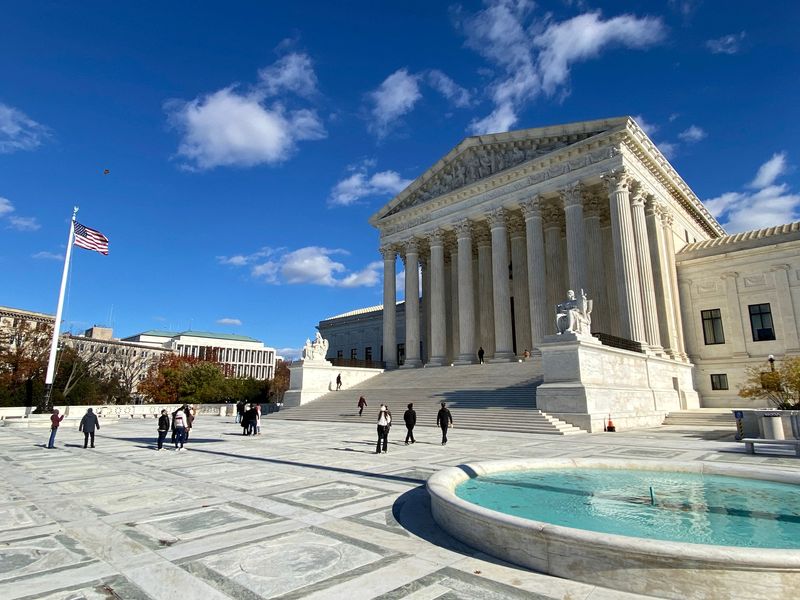By Lawrence Hurley
WASHINGTON (Reuters) -The U.S. Supreme Court on Tuesday took up a major new legal fight pitting religious beliefs against LGBT rights, agreeing to hear an evangelical Christian web designer's free speech claim that she cannot be forced under a Colorado anti-discrimination law to produce websites for same-sex marriages.
The justices agreed to hear Denver-area business owner Lorie Smith's appeal of a lower court's ruling rejecting her bid for an exemption from a Colorado law barring discrimination based on sexual orientation and certain other factors. The case follows the Supreme Court's 2018 ruling in favor of a Christian Denver-area baker who refused on religious grounds to make a wedding cake for a gay couple.
Smith's case gives the justices an opportunity to answer a question that has been raised in other disputes including the baker case but never definitively resolved: can people refuse service to customers in violation of public accommodation laws based on the idea that fulfilling a creative act such as designing a website or baking a cake is a form of free speech under the U.S. Constitution's First Amendment.
"The U.S. Supreme Court has consistently held that anti-discrimination laws, like Colorado's, apply to all businesses selling goods and services. Companies cannot turn away LGBT customers just because of who they are," said Colorado Attorney General Phil Weiser, a Democrat.
Colorado's anti-discrimination law bars anyone from refusing "goods, services, facilities, privileges, advantages or accommodations" based among other things on sexual orientation, age, race, gender and religion. Colorado is among 21 U.S. states that have measures explicitly barring discrimination based on sexual orientation and gender identity in public accommodations.
These laws pose "a clear and present danger to every American's constitutionally protected freedoms and the very existence of a diverse and free nation," said Kristen Waggoner, general counsel of the conservative Christian legal group Alliance Defending Freedom, which represents Smith.
"Colorado has weaponized its law to silence speech it disagrees with, to compel speech it approves of, and to punish anyone who dares to dissent," Waggoner added.
The Supreme Court, with its 6-3 conservative majority, has become increasingly supportive of religious rights and related free speech claims in recent years even as it has backed LGBT rights in other cases.
The justices declined to take up a separate question concerning whether Smith has a religious rights claim, also under the First Amendment. Smith had asked the court to overturn its important 1990 ruling that limited the ability of people to cite their religious beliefs in seeking exemptions from laws that apply to everyone.
VIEWS ON GAY MARRIAGE
Smith runs a web design business called 303 Creative that she wants to operate in accordance with her Christian faith. She believes that marriage should be limited to opposite-sex couples, a view shared by many conservative Christians.
Before adding wedding websites to the services she offered customers, Smith sued Colorado's civil rights commission and other officials in 2016 because of her concern she would be punished under the anti-discrimination law.
Smith's lawyers have said that any state action punishing her for refusing to design websites for gay weddings violates her right to religious expression and her free speech rights.
Jennifer Pizer, senior counsel at LGBT rights group Lambda Legal, said the Supreme Court should "reaffirm and apply longstanding constitutional precedent that our freedoms of religion and speech are not a license to discriminate when operating a business."
Colorado officials have said they never investigated Smith's company and saw no evidence that anyone ever actually asked her to design a website for a same-sex wedding. Lower courts backed Colorado, including the Denver-based 10th U.S. Circuit Court of Appeals in a July 2021 ruling.
The justices are set to hear oral arguments and decide the case in the Supreme Court's next term, which begins in October and ends in June 2023.
The Supreme Court legalized gay marriage nationwide in 2015 and in 2020 expanded protections for LGBT workers under federal law. The Supreme Court has struggled to resolve cases in which conservative religious opposition to LGBT rights has clashed with situations in which LGBT people are seeking to exercise their own rights.

Smith's appeal arises from a dispute similar to the one that prompted the Supreme Court's 2018 ruling on narrow legal grounds siding with a Colorado baker named Jack Phillips. The court said in that case that Colorado's civil rights commission, which imposed sanctions on Phillips for discrimination, was motivated by anti-religious bias.
Similar legal fights involving other small business including a wedding photographer and a calligrapher owners have been waged in other states.